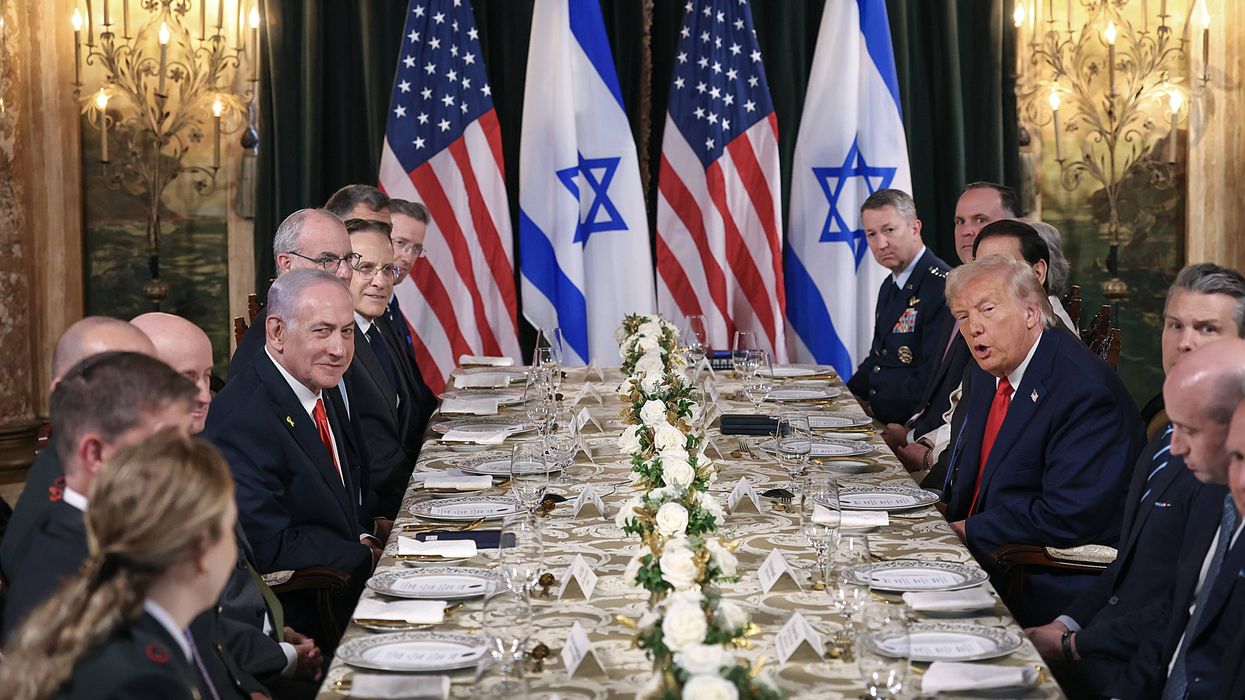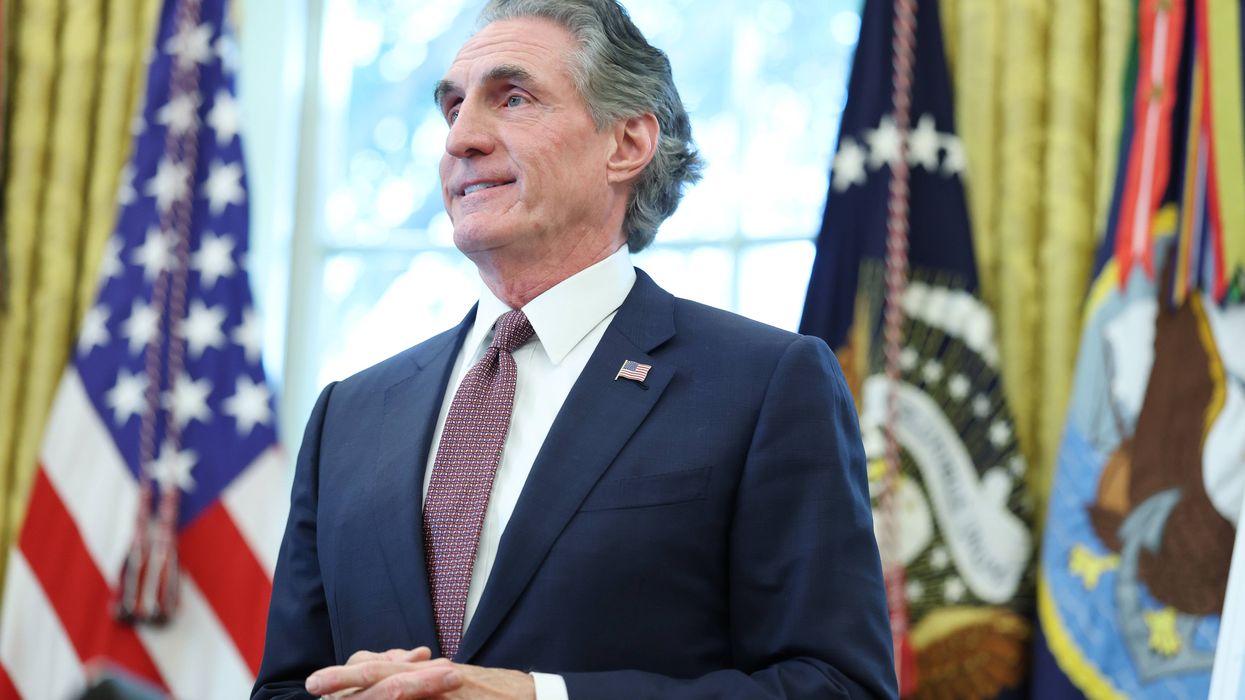April, 20 2009, 11:33am EDT

For Immediate Release
Contact:
National Communications Director Ibrahim Hooper, 202-488-8787 or 202-744-7726, E-Mail: ihooper@cair.com
CAIR Seeks FBI Response to NY Rep's Claim of Mosque Surveillance
Rep. Peter King alleges that ‘a number’ of district mosques being watched
NEW YORK
The New York chapter of the Council on American-Islamic Relations
(CAIR-NY) today called on the FBI to confirm or deny a claim by Rep. Peter King (R-NY) that "a number" of Long Island mosques are under law enforcement surveillance.
In a recent Newsday interview, King said, "right now there are a number of [Long Island] mosques under surveillance by law enforcement agencies." King also claimed the mosques have been under surveillance "for four or five years."
King's allegations about spying on mosques in his district came in
response to a CAIR-NY statement last week calling on elected
representatives to repudiate the congressman's claim that "very few
Muslims come forward to cooperate with the police."
SEE: Peter King Remarks About Mosques Draw Muslim Ire (Newsday)
SEE ALSO: Peter King: I Stand By My Comments on Muslims (Newsday)
CAIR-NY said that if true, such blanket scrutiny would contradict
public assurances by the FBI that American houses of worship are not
subject to routine surveillance.
In responding to ongoing Muslim concerns about reports of informants and agents provocateurs being placed in American mosques, FBI spokesman John Miller stated recently: "The FBI does not investigate mosques, we investigate people." (Washington Post, 3/28/09)
SEE: Some Influential Muslim Groups Question FBI's Actions (LA Times)
SEE ALSO: Muslims Describe FBI Offers to Act as Informants (Detroit News)
U.S. Muslim Coalition Considers Suspending Relations with FBI
At a recent Senate Judiciary Committee hearing, Sen. Russ Feingold (D-WI) asked FBI Director Robert Mueller
"whether mosques have been entered by FBI agents or informants without
disclosing their identities under the authority of the attorney general
guidelines and, if so, how many?" Mueller stated: "I will say that we
do not focus on institutions, we focus on individuals."
SEE: FBI Director Questioned about Muslim Relations
In a 2008 statement refuting claims that
surveillance records of mosques in California were illegally obtained
and disseminated by a group operating out of the Marine Corps Base Camp Pendleton, the FBI said:
"The FBI does not monitor the lawful activities of
individuals in the United States, nor does the FBI have a surveillance
program to monitor the constitutionally protected activities of houses
of worship. We do not target or monitor legal activity of Muslim groups
anywhere in the nation."
SEE: Congress Asked to Probe Surveillance of California Muslims
"Congressman King's claim that law enforcement authorities are
engaged in widespread surveillance of Islamic houses of worship in his
district raises serious civil liberties concerns that must be
addressed," said CAIR-NY Community Affairs Director Faiza N. Ali.
"King's repeated use of Islamophobic rhetoric is of deep concern to
Muslims in his district and to the entire American Muslim community."
She said King's claims that American Muslims are not doing enough to
support national security and law enforcement agencies are contradicted
by FBI Director Mueller, who on April 23, 2008,told theU.S. House
Judiciary Committee: "I re-affirm the fact that 99.9 percent of
Muslim-Americans or Sikh-Americans, Arab-Americans are every bit as
patriotic as anybody else in this room, and that many of our cases are
a result of the cooperation from the Muslim community in the United
States."
At the Senate Judiciary Committee hearing on March 25, 2009,
Director Mueller said the Muslim community "has been tremendously
supportive and worked very closely with [the FBI] in a number of
instances around the country."
In a 2003 interview with The Minaret
magazine, Mueller said: "I would like to thank the Muslim Americans for
their support on the war against terrorism and working with the FBI
around the country as well as state and local law enforcement."
In 2007, CAIR called on Republican leaders to
repudiate remarks by Rep. King in which he said "we have too many
mosques in this country." The Democratic National Committee (DNC) condemned King's statements, calling them "deplorable."
SEE: Rep. King: 'Too Many Mosques' (Video)
King has in the past claimed that the vast majority of mosques in
his state and nationwide are being run by "radicals" and called for
racial profiling of Muslims in airports.
SEE: King Endorses Ethnic Profiling (Newsday)
(Note: King has taken political donations from
members of a New York mosque he claims is a hotbed of radicalism. A
Newsday article stated: "Rep. Peter King is attempting to link his
political opponent to men he calls 'radical' Muslim leaders on Long
Island, but federal records show the congressman accepted thousands of
dollars last year in campaign contributions from some of the same
donors.")
In 2004, King said that "85 percent" of American
Muslim community leaders are "an enemy living amongst us" and that "no
[American] Muslims" cooperate in the war on terror. He made these
claims despite the fact that American Muslims consistently condemn
terrorism and work to protect national security.
SEE: CAIR's Anti-Terrorism Campaigns
During a 2008 hearing of the House Homeland
Security Subcommittee on Intelligence, Information Sharing &
Terrorism Risk Assessment, Rep. Bill Pascrell (D-NJ) challenged King's
criticism of an advertising campaign in New York subway cars designed
to educate the public about Islam. Rep. Pascrell said: "I am deeply
disappointed in any public official or media outlet that would use
harsh rhetoric against this ad campaign which simply seeks to answer
people's questions about Islam."
The Council on American-Islamic Relations (CAIR) is a grassroots civil rights and advocacy group. CAIR is America's largest Muslim civil liberties and advocacy organization. Its mission is to enhance understanding of Islam, protect civil rights, promote justice, and empower American Muslims.
(202) 488-8787LATEST NEWS
Trump Bemoans Not Winning Nobel Peace Prize During Netanyahu Hot Mic
The self-described "most anti-war president in history" has ordered the bombing of at least nine nations—more than any US leader in history—and has been indispensable to Israel's genocide in Gaza.
Dec 29, 2025
President Donald Trump—who has bombed more countries than any US leader in history—once again lamented what he considers his snub for the Nobel Peace Prize during a Monday meeting with fugitive Israeli Prime Minister Benjamin Netanyahu.
In an apparent hot mic moment, Trump, seemingly unaware that there were reporters in the room, speaks to Netanyahu and other Israeli and US officials gathered at the president's Mar-a-Lago club in Florida about the "35 years of fighting" between two unspecified countries that he "stopped."
"Do I get credit for it? No," Trump says, adding before being interrupted by Netanyahu, "They gave the Nob..."
As something of a consolation prize, Netanyahu said Monday that he's awarding Trump with the Israel Prize, that nation's highest cultural honor. Trump will be the first foreign leader to receive the award.
Football's global governing body also gave Trump its inaugural—and widely derided—FIFA Peace Prize earlier this month in recognition of the administration's role in brokering an end to international conflicts.
"I did eight of them," Trump said during the hot mic—likely referring to the number of wars he falsely claims to have ended—before seeming to notice the journalists and changing the subject.
Trump ranting to Netanyahu on a hot mic: "Do I get credit for it? No. They gave the Nob-- I did 8 of them. How about India and Pakistan? So I did 8 of them. And then I'll tell you the rest of it."
[image or embed]
— Aaron Rupar (@atrupar.com) December 29, 2025 at 10:57 AM
Trump did nine of them—as in the number of countries he's bombed, breaking former President Barack Obama's record of seven. Over the course of his two terms, Trump has ordered the bombing of Afghanistan, Iran, Iraq, Libya, Nigeria, Pakistan, Somalia, Syria, and Yemen, as well as boats allegedly transporting drugs in the Caribbean Sea and Pacific Ocean.
Thousands of civilians have been killed or wounded during these campaigns, according to experts.
Trump has recently deployed warships and thousands of US troops near Venezuela, which could become the next country attacked by a the self-described "the most anti-war president in history."
The US president has also backed Israel's genocidal war on Gaza, which has left more than 250,000 Palestinians dead, maimed, or missing, and around 2 million others forcibly displaced, starved, or sickened. Israel's conduct in the war is the subject of an ongoing International Court of Justice genocide case filed by South Africa.
Meanwhile, Netanyahu and his former defense minister Yoav Gallant are wanted by the International Criminal Court for alleged war crimes and crimes against humanity in Gaza, including murder and forced starvation.
“He is a wartime prime minister. He’s done a phenomenal job," Trump said while standing with Netanyahu later on Monday. "He’s taken Israel through a very dangerous period of trauma."
He is also accused of prolonging the Gaza war to forestall a reckoning in his domestic corruption trial, in which Trump has intervened by requesting a pardon.
“Israel, with other people, might not exist right now," Trump added. "If you had the wrong prime minister, Israel right now would not exist.”
Keep ReadingShow Less
New State Laws Aim to Protect Environment, Consumers as Trump Wages All-Out War on Climate
"The gridlock and partisanship we see in Washington, DC can be dispiriting. But history shows that states can build momentum that eventually leads to change at the federal level."
Dec 29, 2025
Even as President Donald Trump and his administration have been ripping up environmental and consumer protection regulations, a number of state laws are set to take effect next year that could at least mitigate some of the damage.
A Monday statement from Environment America and the Public Interest Network highlighted a number of new laws aimed at curbing corporate polluters and enhancing consumer welfare.
First, the groups highlighted "Right to Repair" laws set to take effect in Washington, Nevada, Oregon, and Colorado, which give people the right to repair their own appliances and electronics without burdensome costs or barriers.
The groups lavished particular praise on Colorado's "Right to Repair" laws that they said provide "the broadest repair protections in the country," with new regulations that will give businesses in the state "access to what they and independent repair providers need to fix their electronics themselves."
Illinois, meanwhile, will fully phase out the sale of fluorescent lightbulbs, which will be replaced by energy-efficient LED bulbs. The groups estimate that eliminating the fluorescent bulbs will collectively save Illinois households more than $1.5 billion on their utility bills by 2050, while also reducing energy waste and mercury pollution.
Illinois also drew praise for enacting a ban on polystyrene foam foodware that will take effect on January 1.
The groups also highlighted the work being done in Oregon to protect consumers with legislation mandating price transparency to eliminate surprise junk fees on purchases; prohibiting ambulance companies from socking out-of-network patients with massive fees for rides to nearby hospitals; and placing new restrictions on the ability of medical debt to negatively impact a person's credit score.
California also got a mention in the groups' release for closing a loophole that allowed supermarkets to continue using plastic bags and for creating a new privacy tool for consumers allowing them to request that online data brokers delete all of the personal information they have gathered on them over the years.
Emily Rusch, vice president and senior director of state offices for the Public Interest Network, contrasted the action being taken in the states to protect consumers and the environment with a lack of action being done at the federal level.
"The gridlock and partisanship we see in Washington, DC can be dispiriting," said Rusch. "But history shows that states can build momentum that eventually leads to change at the federal level. As we build on this progress in 2026, we look forward to working with anyone—Republican, Democrat, or independent—with whom we can find common ground."
Keep ReadingShow Less
Watchdog Warns Trump and Burgum's Halting of Offshore Wind Projects Is Illegal
“Burgum’s actions on offshore wind appear to be motivated by the personal financial interests of those in the administration, not our collective national interests."
Dec 29, 2025
A week after the US Department of the Interior said it was immediately halting five offshore wind projects in the interest of "national security," a watchdog group told congressional committees Monday that the move is "not legally defensible" and raises "significant" questions about conflicts of interest concerning a top DOI official's investments in fossil gas.
Timothy Whitehouse, executive director of Public Employees for Environmental Responsibility (PEER), wrote to the top members of the Senate Energy and Natural Resources Committee and the House Committee on Natural Resources regarding the pause on projects off the coasts of Virginia, New York, Rhode Island, Connecticut, and Massachusetts—projects that account for billions of dollars in investment, employ thousands of people, and generate sustainable energy for roughly 2.5 million homes and businesses.
The announcement made by Interior Secretary Doug Burgum last week pertained to "five vague, perfunctory, cookie-cutter orders" halting the projects, wrote Whitehouse, but PEER is concerned that the orders were issued to evade the Congressional Review Act (CRA), under which the action to halt the projects likely constitutes a "major rule."
Whitehouse explained:
Under the CRA, a rule that meets any one of three criteria (an annual effect on the economy of $100,000,000 or more; a major increase in costs or prices for consumers, individual industries, federal, state, or local government agencies, or geographic regions; or in pertinent part significant adverse effects on competition, employment, investment, productivity, or innovation) is a major rule. Interior’s pause likely meets all three.
As a major rule under the CRA, the pause cannot take effect until at least 60 days after BOEM provides Congress the requisite notification and report under the CRA, which, according to GAO’s database, has not yet occurred. Congress must use its oversight authority to unveil the truth and, as appropriate, and to enforce the rule of law.
He said in a statement that “Burgum’s move is designed to bypass all congressional and public input."
The CRA states that a rule is "the whole or a part of an agency statement of general or particular applicability and future effect designed to implement, interpret, or prescribe law or policy or describing the organization, procedure, or practice requirements of an agency.”
Press statements by the DOI and by Burgum last week were "statements of general applicability and imminent future effect, designed to implement policy," wrote Whitehouse, who also said the interior secretary embarked on "a coordinated rollout with Fox News entities."
On December 22, Fox anchor Maria Bartiromo asked Burgum at 8:00 am Eastern, “What next action did you want to tell us about this morning?” Five minutes later, FoxNews.com published its first story on Burgum's orders, citing a press release that had not yet been made public and including a quote from the secretary about the "emerging national security risk" posed by the offshore wind projects.
"If last week’s actions are allowed to stand, future presidents will have unchecked authority under the guise of national security to target federal leases related to entire disfavored energy industries for political purposes."
Burgum's announcement to Fox came at least one to two hours before Bureau of Ocean Energy Management (BOEM) acting Director Matthew Giacona provided the orders to the lessees running the five wind projects.
Further, wrote Whitehouse, "Burgum’s voluminous public comments in the hours and days since the pause further show the true purpose of Interior’s singular action."
"The national security pretext quickly gives way to broad and spurious talking points about the 'Green New Scam,' how 'wind doesn’t blow 24-7' (evincing Burgum’s seeming unfamiliarity with energy storage technologies), and unyielding promotion of liquified natural gas projects," wrote Whitehouse.
Aside from the alleged illegality of Burgum's order, PEER pointed to Giacona's potential conflicts of interest with BOEM operations and specifically with halting wind projects. Giacona is a "diligent filer" of financial disclosure forms required by the Ethics in Government Act, noted Whitehouse—but those forms point to potential benefits he may reap from shutting down offshore wind infrastructure.
Giacona reported his purchase of interests in the United States Natural Gas Fund (UNG) on September 16. The fund tracks daily price movements of "natural" gas delivered at the Henry Hub in Louisiana and is subject to regulation by the Commodity Futures Trading Commission.
"Accordingly, a government employee who has an interest in UNG also has a potential conflict of interest with the underlying holdings of UNG (currently primarily natural gas futures contracts at the Henry Hub)," wrote Whitehouse.
PEER does not know whether Giacona continues to hold a financial interest in UNG or whether the offshore wind pause will have a "direct and predictable effect on a financial interest in UNG," but Whitehouse noted that Burgum and DIO have entwined the pause with the promotion of liquefied natural gas.
"It is disconcerting that Mr. Giacona temporarily had even a de minimis financial interest in natural gas futures while also leading the agency that manages the development of natural gas resources on the outer continental shelf," wrote Whitehouse, adding that Giacona also sold interests in the United States Oil Fund on September 3, while overseeing BOEM.
Based on Giacona's investments, said Whitehouse, “Burgum’s actions on offshore wind appear to be motivated by the personal financial interests of those in the administration, not our collective national interests. This is another misguided step in transforming the federal government into a franchise of the fossil fuel industry.”
“On public lands across the United States, the Department of the Interior has tens of thousands of additional active leases related to oil, gas, wind, solar, and geothermal production and mining for energy-related minerals," he added. "If last week’s actions are allowed to stand, future presidents will have unchecked authority under the guise of national security to target federal leases related to entire disfavored energy industries for political purposes."
Keep ReadingShow Less
Most Popular


